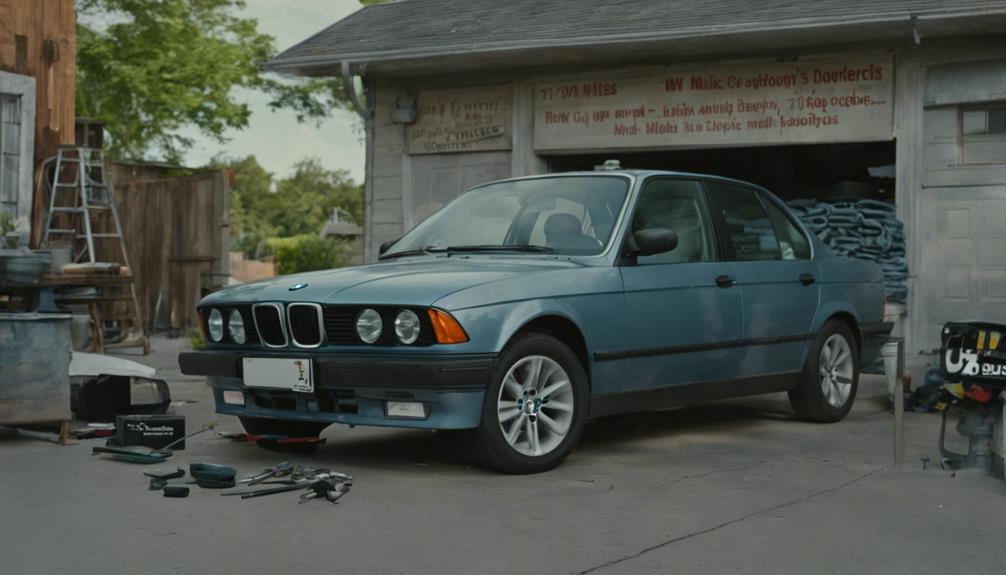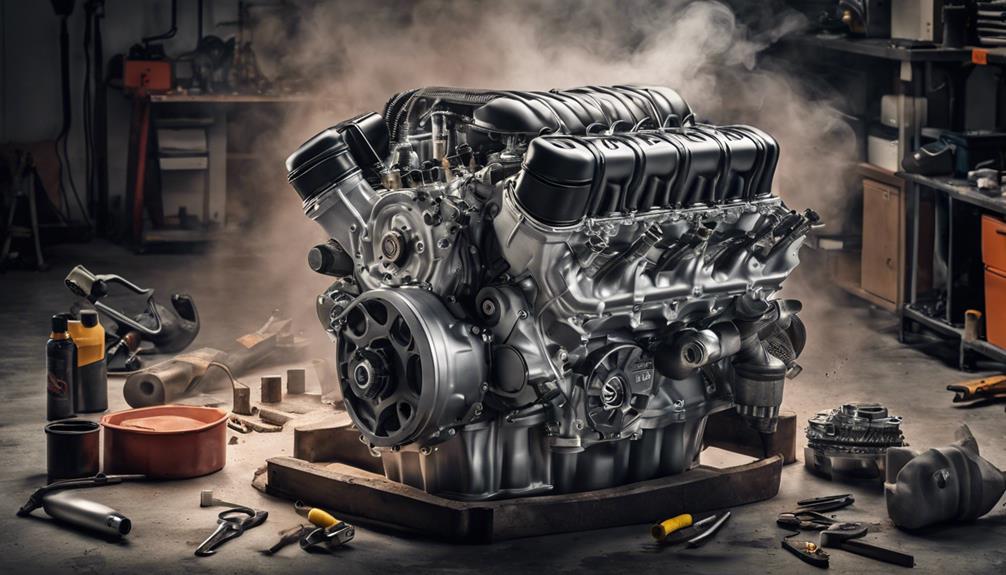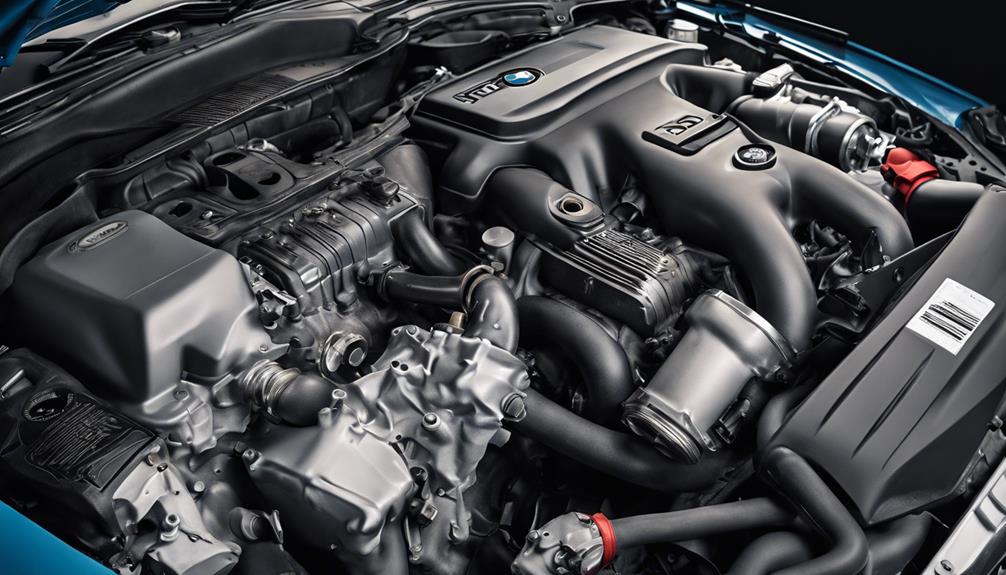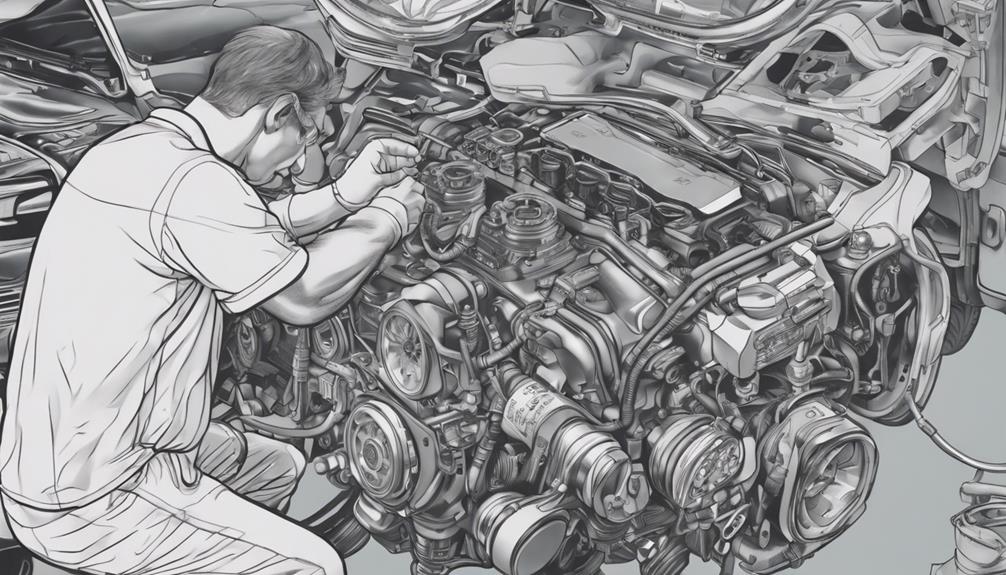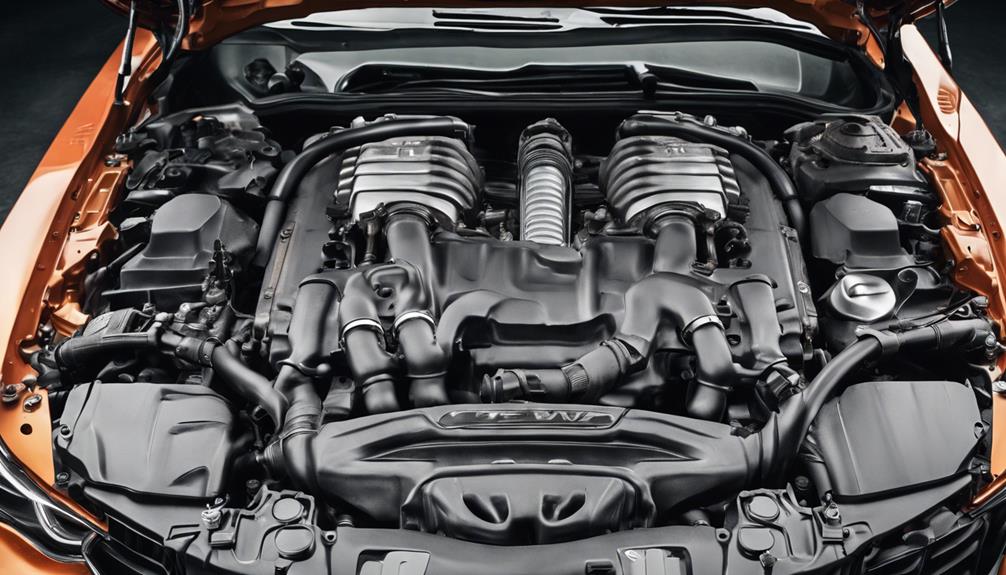Once your BMW clocks over 100k miles, keeping up with regular maintenance becomes essential to guarantee its reliability and longevity. A thorough service history and attention to service intervals are key to avoiding performance issues down the road. Genuine parts like spark plugs, coils, and gaskets play a pivotal role in maintaining peak performance. Remember, a well-maintained BMW post-100k can still deliver that driving pleasure you love. If you want to know more about how to maximize your BMW's reliability after 100k, keep exploring for expert insights and maintenance tips.
Key Takeaways
- Regular maintenance post 100k miles ensures BMW reliability.
- Thorough service history aids in endurance and performance.
- Neglecting maintenance can lead to performance issues.
- Service intervals adherence is crucial for optimal performance.
- Maintenance schedule is vital for long-term reliability.
Maintenance Importance

Regularly maintaining your BMW is the key to ensuring its reliability even after surpassing the 100,000-mile mark. When it comes to BMWs, diligent maintenance is akin to giving your car a longevity potion.
Your BMW's reliability post 100k miles is closely tied to how well you stick to the maintenance schedule. A thorough service history isn't just a fancy addition; it's the backbone of your BMW's endurance. Think of it as a diary of care that your BMW wears proudly.
Neglecting maintenance could turn your BMW from a smooth operator to a grumbly troublemaker, regardless of the mileage. So, pay attention to those service intervals like your BMW pays attention to the road.
Key Replacement Parts
When it comes to BMW key replacement parts, choosing the correct components can make a significant difference in your vehicle's post-100k mile reliability. Common key issues such as coils, spark plugs, and injectors should be addressed with genuine parts to guarantee peak performance.
Understanding the cost, availability, and necessity of these replacements can help you maintain your BMW's longevity beyond the 100,000-mile mark.
Common Key Issues
Key replacement parts such as spark plugs and coils are essential elements to factor in for maintaining the reliability of your BMW after reaching 100k miles.
Alongside these, keep a close watch on your injectors to guarantee top-notch fuel delivery, and don't overlook the importance of inspecting and potentially replacing primary O2 sensors for peak engine performance.
Valve cover gaskets are crucial to preventing oil leaks, a common issue in BMW engines, while also considering intake manifold gaskets and intake valve cleaning to uphold engine efficiency.
Cost of Replacements
When it comes to maintaining your BMW's reliability after reaching 100,000 miles, understanding the costs of replacing key parts like spark plugs and coils is essential for budgeting and ensuring peak performance. Here's a breakdown of potential replacement costs for key components:
- Spark Plugs and Coils: Replacement costs can range from $500 to $1,000.
- O2 Sensor: Expect to pay around $200 to $300 for this vital component.
- Coolant Flange: Budget approximately $50 to $100 for the part plus labor.
- Injectors: Inspecting and potentially replacing injectors may cost between $500 to $1,000, inclusive of parts and labor.
Being aware of these costs can help you plan and maintain your BMW's performance without breaking the bank.
Availability of Parts
For maintaining your BMW's reliability beyond 100,000 miles, ensuring access to essential replacement parts is paramount. When it comes to parts availability, BMW owners have a variety of options to choose from. Whether you prefer the peace of mind that comes with Original Equipment Manufacturer (OEM) parts or are looking for more cost-effective alternatives provided by the aftermarket, there are choices to suit your needs. Common components like spark plugs, filters, brake pads, and sensors are typically readily available for most BMW models through authorized dealerships, independent auto shops, and online retailers. Being able to source these key replacement parts efficiently is key to keeping your BMW running smoothly even after hitting that 100k milestone.
| OEM Parts | Aftermarket Parts |
|---|---|
| Top-notch performance and longevity | Cost-effective alternatives |
| Generally available through authorized dealerships | Offered by some independent auto shops and online retailers |
Original Parts Advantage
Certainly, selecting genuine components such as coils from Delphi or Bosch for your BMW post-100k guarantees a reliable performance you can rely on. When it comes to maintaining your BMW's reliability and longevity, sticking to original parts is the way to go. Here's why:
- Critical Performance: Original coils ensure a consistent and dependable performance, vital for a smooth driving experience.
- Durability: Original spark plugs from Bosch or NGK help in extending the engine's lifespan, providing you with years of trustworthy service.
- Peak Performance: Correct injectors for early model N55 engines are essential for the best functioning of your BMW, ensuring it operates at its peak.
- Undoubtedly: Opting for OEM parts after 100k miles helps prevent potential problems, safeguarding your BMW's performance and durability.
Common Issues Addressed

Addressing the common issues in BMWs after reaching 100k miles requires a proactive approach to maintenance and care. BMW reliability hinges on staying ahead of potential problems. Common issues like electrical gremlins, suspension quirks, and cooling system hiccups can crop up. Regular upkeep and part replacements can ward off breakdowns.
Neglecting maintenance is a surefire way to invite trouble, regardless of the mileage. However, high mileage isn't a deal-breaker if the car boasts a well-documented service history. It's like giving your BMW a health check-up; a stitch in time saves nine.
Prompt Issue Resolution
You know the drill – when it comes to keeping your BMW purring past 100k, quick thinking and swift actions are your best pals.
Timely problem-solving and efficient resolution processes can be your saving grace in maintaining that BMW reliability.
Timely Problem Solving
After surpassing 100,000 miles, promptly resolving issues with your BMW is key to maintaining its reliability and performance. Here's a quick guide to ace your timely problem-solving game:
- Swift Action: Act promptly when you notice any issues to prevent them from escalating.
- Regular Maintenance: Stay on top of regular maintenance schedules to nip potential problems in the bud.
- Professional Consultation: Don't hesitate to consult experts for efficient solutions and advice tailored to your BMW.
- Proactive Approach: Adopt a proactive stance towards maintenance and repairs post-100k miles to keep your BMW running smoothly for longer. Remember, a stitch in time saves nine, or in this case, a well-maintained BMW after 100k miles!
Efficient Resolution Process
Efficiently resolving issues with your BMW post-100k miles requires a proactive and strategic approach to maintain its reliability and performance. Keeping a detailed service history and staying on top of maintenance are essential for a smooth ride even with high mileage.
Remember, neglecting regular care can lead to problems regardless of how many miles your BMW has clocked. By prioritizing consistent maintenance, you can navigate past the 100,000-mile mark without major hiccups.
Stay ahead of potential issues by being diligent with your BMW's upkeep and addressing any concerns promptly. Your diligence in caring for your BMW will pay off in the long run, ensuring a reliable driving experience well beyond 100k miles.
Quick Fixes for Issues
For prompt issue resolution with your BMW post-100k miles, consider swift and effective fixes for common problems that can arise with aging vehicles. Here's a quick rundown of essential fixes to keep your BMW running smoothly:
- Replace Spark Plugs: Worn-out spark plugs can lead to rough idling and decreased fuel efficiency.
- Address Misfires: Failing coils and a brittle coolant flange can cause misfires; swift action can prevent further damage.
- Inspect Injectors: Faulty injectors can disrupt fuel delivery, affecting engine performance.
- Check Coolant Flange: A brittle coolant flange can lead to coolant leaks, overheating, and potential engine damage.
Expert Collaboration Benefits
Collaborating with automotive experts like Joel from Raleigh Motorsports can greatly enhance your BMW's reliability and performance beyond 100k miles. Joel's expertise in tackling specific maintenance tasks, such as valve cover gasket replacement and walnut blasting intake valves, can guarantee your BMW operates at its best even at high mileage. Working together with Joel not only results in successful repairs but also aids in identifying potential issues early on, like brittle coolant flanges or failing coils, preventing major problems in the future. By leveraging Joel's knowledge, you can effectively address maintenance needs and keep your BMW well-maintained post 100k miles.
| Expert Collaboration Benefits | |
|---|---|
| Increased Reliability | Joel's insight can lead to successful repairs, enhancing your BMW's reliability. |
| Peak Performance | Specific maintenance tasks addressed by Joel can boost your BMW's performance post 100k. |
| Early Issue Identification | Collaborating with experts like Joel helps in spotting potential problems before they escalate. |
Maintenance Tips for Longevity

To maximize the longevity of your BMW beyond 100,000 miles, prioritize regular maintenance tasks like replacing spark plugs and coils. These components play an essential role in the engine's performance and efficiency, ensuring a smooth ride even as your odometer climbs higher.
Additionally, inspecting and potentially replacing injectors, coolant, and O2 sensors can prevent major issues down the road. Don't overlook tasks like valve cover gasket replacement and walnut blasting intake valves, as they're fundamental for your BMW's long-term health.
Using original parts from reputable brands like Bosch or NGK is key to maintaining reliable performance post 100k miles. Addressing potential issues such as brittle coolant flanges and misfires due to failing coils is crucial in preserving the dependability of your BMW well after hitting the 100,000-mile mark.
Regular maintenance is the secret sauce to keeping your BMW running smoothly for years to come.
Valve Maintenance Importance
Maintaining the proper upkeep of your BMW's valves is essential for protecting against oil leaks, engine damage, and potential overheating issues. Valve cover gaskets play a vital role in preventing oil leaks and safeguarding the engine. Be wary of diaphragm tears in these gaskets, as they can result in oil seepage and potential engine overheating.
Regularly inspecting and cleaning intake valves is imperative to maintain adequate airflow and engine performance. Neglecting valve maintenance can lead to reduced engine power and potential costly repairs in the future.
Ensuring Smooth Performance

Staying on top of essential maintenance for your BMW's valves isn't just about preventing issues; it's crucial for ensuring smooth performance even after hitting the 100,000-mile mark. Here's a breakdown to help you maintain your BMW's performance post-100k:
- Maintenance Matters: Regular maintenance checks can nip potential problems in the bud, ensuring your BMW runs smoothly well past 100k miles.
- Service History Savvy: Keeping a detailed service history helps track what's been done and what needs attention, aiding in maintaining performance.
- High Mileage, No Problem: High mileage isn't a concern if your BMW has received the recommended maintenance; it's the care that counts.
- Neglect Is Not an Option: Neglecting maintenance can lead to costly repairs and hinder performance, irrespective of the mileage.
Frequently Asked Questions
Do BMWs Last Over 100k Miles?
Yes, BMWs can last over 100k miles with proper care and maintenance. Diligent service routines and attention to upkeep are key. Neglecting maintenance is risky, but a well-maintained BMW can be reliable post-100k.
What Is High Mileage for a Bmw?
When it comes to BMWs, high mileage is typically considered over 100,000 miles. Despite this milestone, with proper maintenance and care, your BMW can still run smoothly and reliably beyond 100k.
Is BMW Reliable in Long Term?
In the long term, BMWs can be reliable if properly maintained. Regular servicing and care are key. Don't skimp on upkeep; neglect can cause issues regardless of mileage. Treat your BMW right for smooth sailing ahead.
How Many Miles Does a BMW Last?
For you, a BMW can last well over 100,000 miles with proper maintenance. Regular care and servicing are crucial. High mileage isn't a problem if you keep up with upkeep. Maintenance records and care are key for reliability.
Conclusion
You've put in the work to keep your BMW running smoothly even after hitting the 100k mark. By staying on top of maintenance, replacing key parts, and addressing common issues promptly, you've guaranteed reliability for the long haul.
Remember, keeping up with maintenance tips, like valve maintenance, will help keep your BMW performing at its best for years to come.
Keep up the good work and enjoy the ride!





